What Teachers Say About School Choice vol. 3
We’re back with the third installment of the What Teachers Say About School Choice series, which features feedback we’ve received on social media from educators and administrators — along with how we listen and respond.
In our first post on the topic, we said,
“Our ultimate hope is teachers, many of whom might be reading right now, will see that we aren’t all talk. We do listen. We can find common ground. We can be a trusted resource for research and information. And most importantly, we respect and support them.
As we’ve said before, we will always stand by that sentiment. Though many of the comments we receive from teachers are hostile to choice, with time and increased public attention on the issue, more educators are opening their minds and speaking out in support of educational choice options for all families.
Check out more of what teachers say about school choice and how we respond below.
1. The Real Meaning of Funding Public Education?
As a public school teacher, we understand why Glenda might think this way. Our organization sees things differently.
The government has an obligation to fund education for the public, but that’s a different goal than “public education.” In fact, private schools, home schools, online schools, charter schools and other non-traditional public schools all play a part in educating the public.
The reality is that kids need options because they don’t all learn the same way. Many kids struggle or are simply better-suited for an environment that’s different from whatever public school their ZIP Code dictates for them. Of course, that’s not to say many aren’t perfectly suited for their assigned public schools. The important question to ask is: If we are truly committed to educating the public, why should kids who attend one type of school be the only ones to receive public funding for their education?
2. The Silent Voices of Public School Parents?
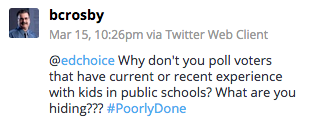
@bcrosby tweeted this in response to one of our voter polls. In our 2015 national poll, for instance, we report these two findings among many others:
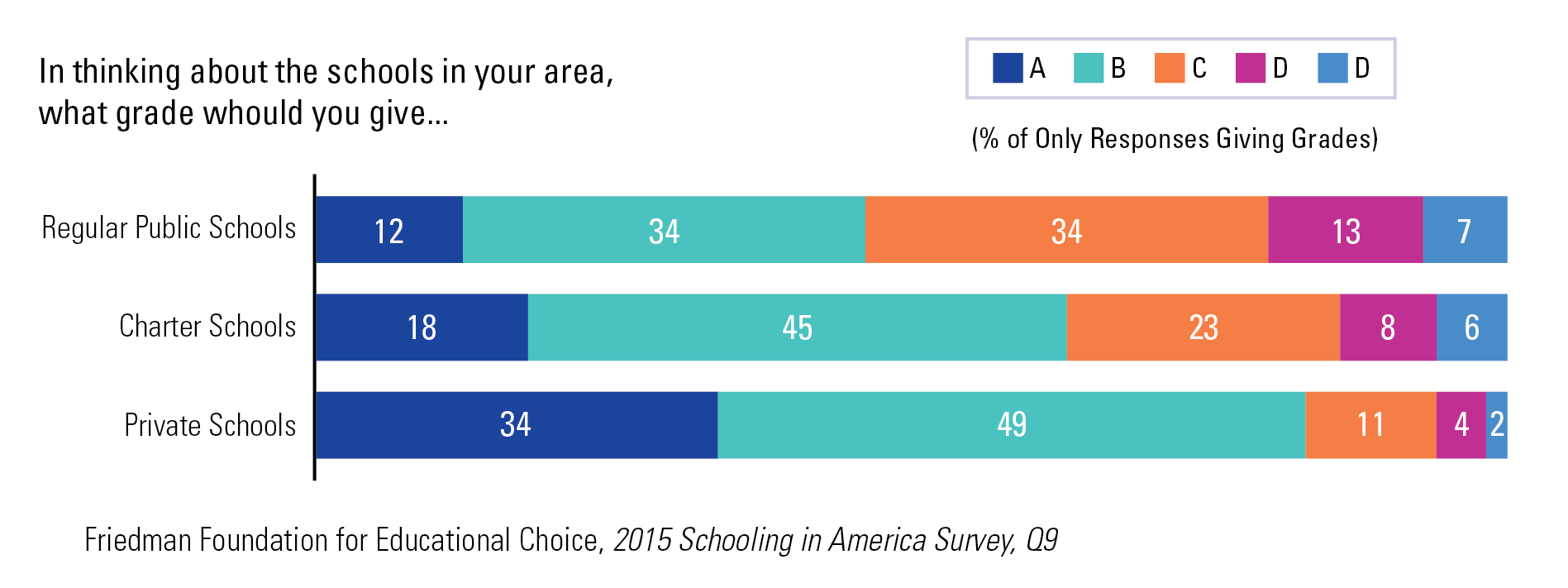
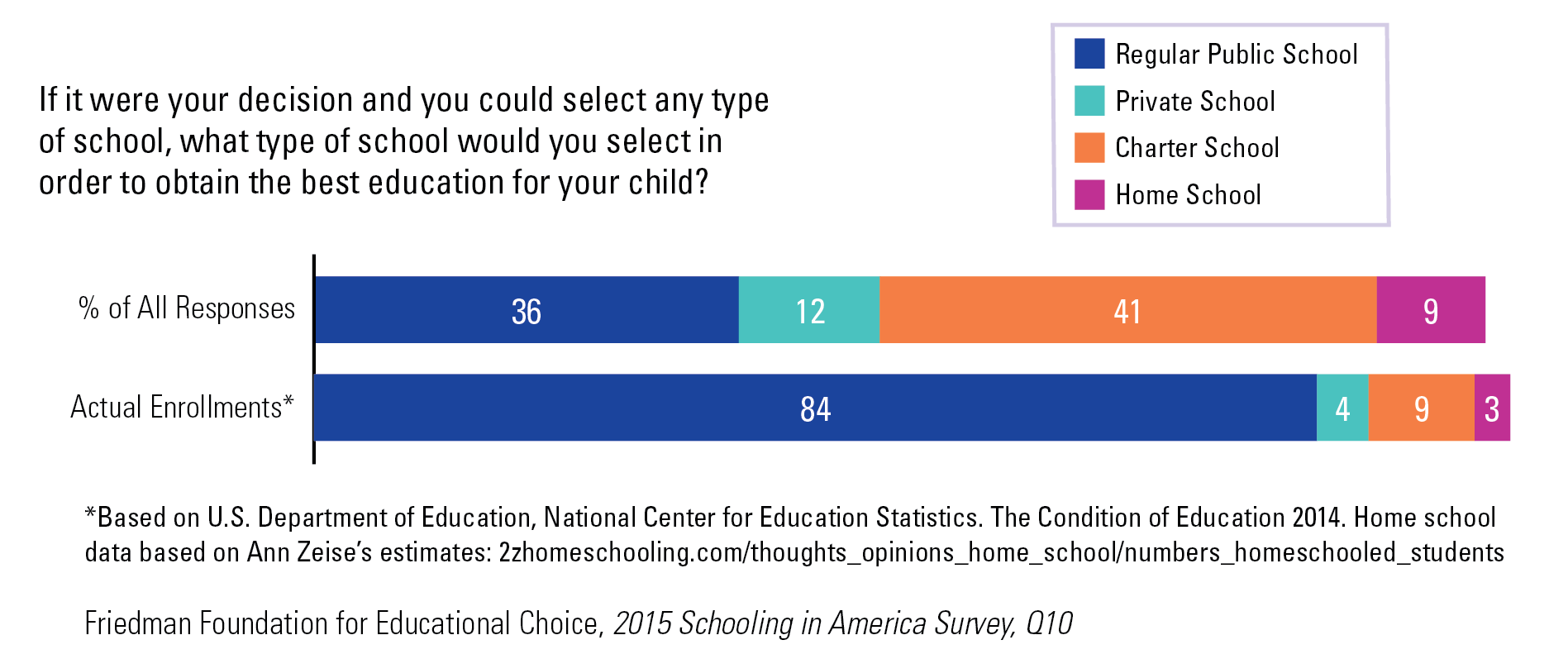
@bcrosby’s assumption is that none or very few of the people in our random sampling of American adults include parents with students in public schools.
Two important pieces of information are necessary to understand why his claim is bunk.
First, our survey’s statistical results were weighted based on demographics to reflect representative proportions of Americans. And those demographic breakouts in our poll include school parents and non-parents.
Second, the vast majority of school parents in America (84 percent) are parents of public school students.
These are all things he could have—and might have—read for himself in our report. The findings simply didn’t fit his intended narrative: That our research is skewed to leave out the perspectives of public schoolers, and we are hiding how happy public school parents are with their schools.
We have never shied away or hidden such information. Our national survey shows that school parents (remember, 84 percent of which have kids in public schools) report this:

The data are clear.
Sixty-three percent of school parents—if given the freedom to choose—would not choose their local public school, and the majority of those parents are current public school parents. That’s not an indictment of all public schools. It simply shows that a one-size-fits-all goal does not match up with what parents want.
Stay tuned to our blog and social media over the next few months as we prepare to release our 2016 national school choice survey.
(Note: We are recognized by the American Association for Public Opinion Research as a charter member of its Transparency Initiative, which you can read more about here.)
3. Vouchers Can’t Help Poor Families?

Rhonda is a retired New Mexico educator who now works in some capacity for a local school district as well as for the American Federation of Teachers, one of the nation’s largest teachers’ unions and one of the highest-spending anti-voucher lobbying groups.
We engaged in a conversation with her, and she never provided specifics nor evidence to support her claim that vouchers don’t work. But she does bring up a common concern in the second half of her comment.
Let’s take Indiana as a case study here. Indiana has a very robust school choice environment, including charter schools, school vouchers, tax-credit scholarships and a private and homeschool tax deduction. The state’s voucher program alone is the largest in the country with more than 32,000 students participating.
The data show us that the majority (at least 86 percent) of students using the voucher program are from lower income households ($67,432 or less for a family of four). We also know that Indiana’s program has an extremely high student retention rate (81 percent).
A 2014 study of Indiana’s private education sector finds 55 percent of the state’s private schools offer voucher parents additional financial assistance should they need it.
A 2016 survey finds 93 percent of Indiana voucher and tax-credit scholarship program parents are some level of satisfied with their current schools of choice. That’s a 75 percent increase in parental school satisfaction based on their previous school satisfaction levels.
Because students must be matched and enrolled in a private school to receive their voucher funds, we know from this data that:
- the program is accessible for low-income families and
- private schools want, accept, assist and keep low-income voucher students in their schools.
4. Supporting School Choice = Not Supporting Teachers?
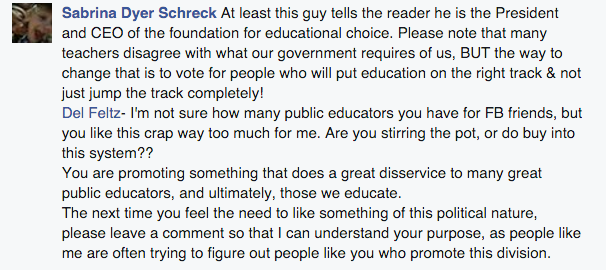
In this comment, Sabrina makes baseless claims that educational choice programs harm public school teachers and students and wrongly assumes that all public educators oppose them. Sadly, many choice opponents count on the fact that most people don’t know the facts—including the fact that many public school teachers use choice programs or pay tuition to send their own children to private schools.
What’s worse, many use these claims as tools to shame and silence would-be supporters. As our latest guest-written blog post by veteran teacher Gretchen Davies says, there are reasons most public educators haven’t yet gone public with their support of school choice.
I hope there are more teachers who share my opinion but perhaps are just kept quiet for fear of retribution. Unfortunately, I haven’t met any, and that is probably because I, too, have kept quiet, so that I am not chastised by my mentors and peers. However, I have grown tired of being quiet. I care about and rally for the best educational options for children, which is why I chose to work in education.
-Gretchen Davies
The truth is lots of public school teachers do support educational choice.
See?
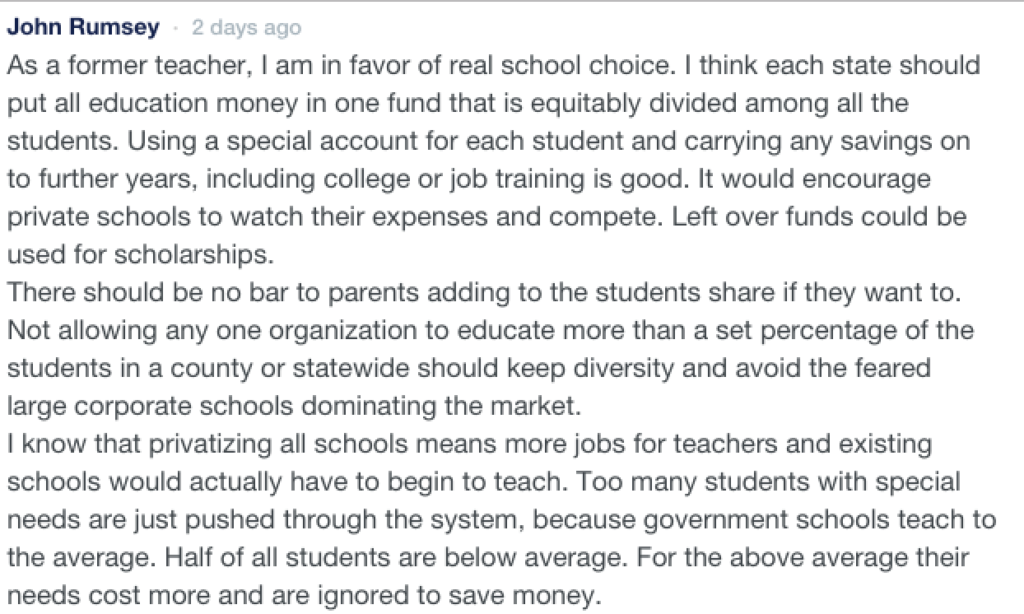
See?
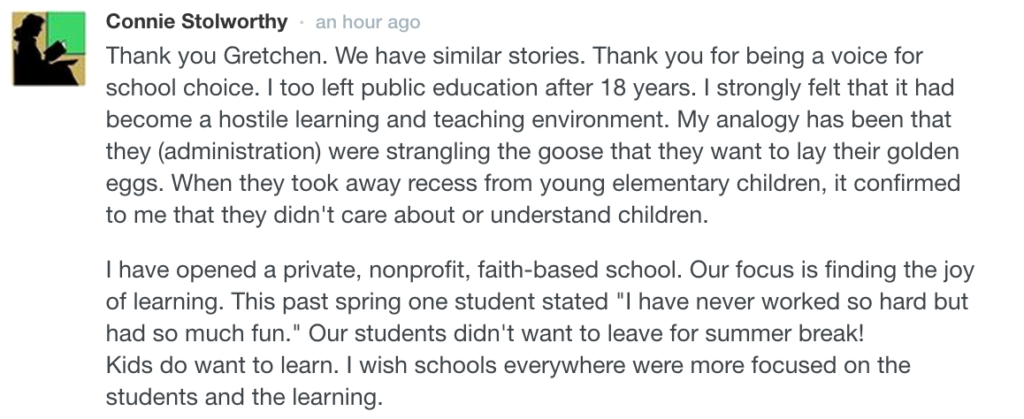
Our advice, should our readers ever find themselves in a similar situation, is to stay respectful, but stand strong. Supporting school choice isn’t “jumping the tracks.” It’s upgrading the train system altogether.
Interested in reading more in this series? Check out our past installments.
Friday Freakout: What Teachers Say to School Choice vol. 1
Friday Freakout: What Teachers Say About School Choice vol. 2




